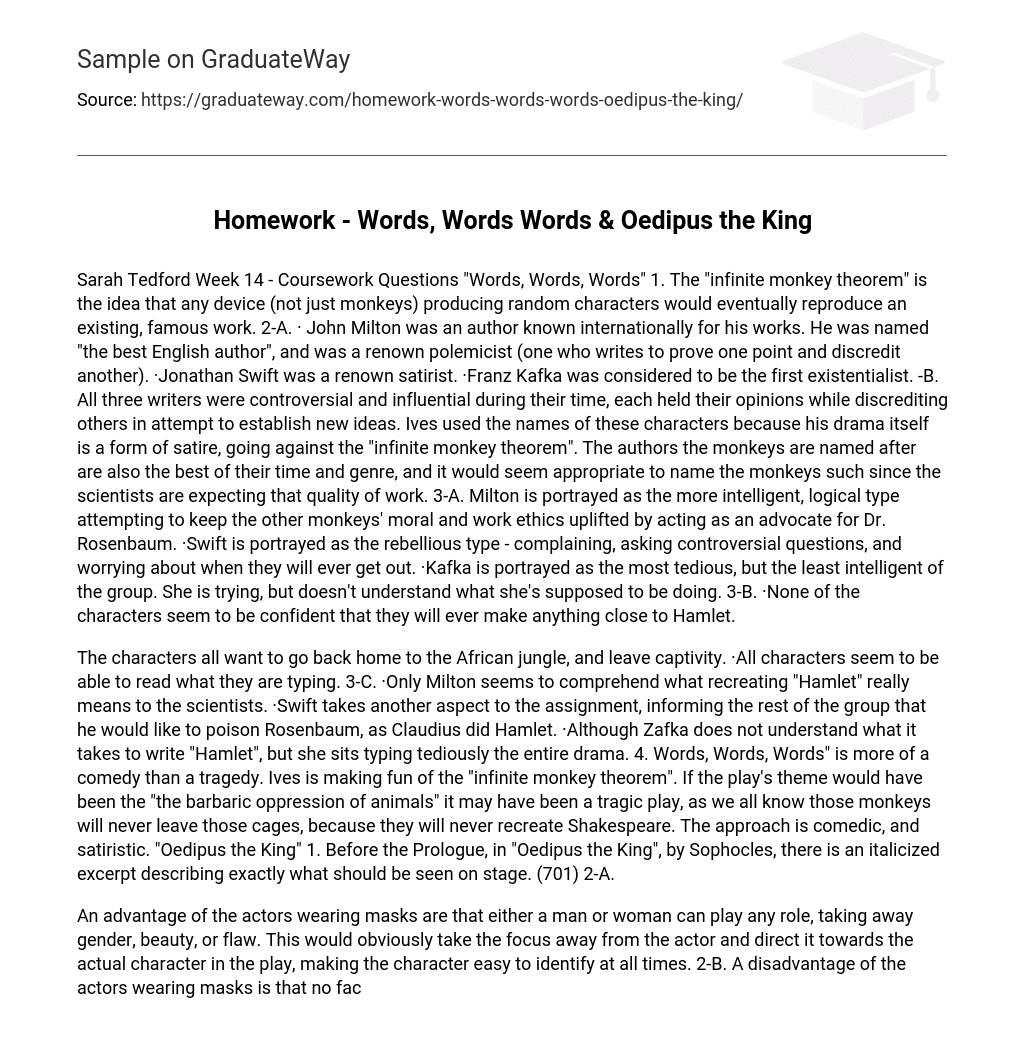Sarah Tedford Week 14 – Coursework Questions “Words, Words, Words” 1. The “infinite monkey theorem” is the idea that any device (not just monkeys) producing random characters would eventually reproduce an existing, famous work. 2-A. · John Milton was an author known internationally for his works. He was named “the best English author”, and was a renown polemicist (one who writes to prove one point and discredit another). ·Jonathan Swift was a renown satirist. ·Franz Kafka was considered to be the first existentialist. -B. All three writers were controversial and influential during their time, each held their opinions while discrediting others in attempt to establish new ideas. Ives used the names of these characters because his drama itself is a form of satire, going against the “infinite monkey theorem”. The authors the monkeys are named after are also the best of their time and genre, and it would seem appropriate to name the monkeys such since the scientists are expecting that quality of work. 3-A. Milton is portrayed as the more intelligent, logical type attempting to keep the other monkeys’ moral and work ethics uplifted by acting as an advocate for Dr. Rosenbaum. ·Swift is portrayed as the rebellious type – complaining, asking controversial questions, and worrying about when they will ever get out. ·Kafka is portrayed as the most tedious, but the least intelligent of the group. She is trying, but doesn’t understand what she’s supposed to be doing. 3-B. ·None of the characters seem to be confident that they will ever make anything close to Hamlet.
The characters all want to go back home to the African jungle, and leave captivity. ·All characters seem to be able to read what they are typing. 3-C. ·Only Milton seems to comprehend what recreating “Hamlet” really means to the scientists. ·Swift takes another aspect to the assignment, informing the rest of the group that he would like to poison Rosenbaum, as Claudius did Hamlet. ·Although Zafka does not understand what it takes to write “Hamlet”, but she sits typing tediously the entire drama. 4. Words, Words, Words” is more of a comedy than a tragedy. Ives is making fun of the “infinite monkey theorem”. If the play’s theme would have been the “the barbaric oppression of animals” it may have been a tragic play, as we all know those monkeys will never leave those cages, because they will never recreate Shakespeare. The approach is comedic, and satiristic. “Oedipus the King” 1. Before the Prologue, in “Oedipus the King”, by Sophocles, there is an italicized excerpt describing exactly what should be seen on stage. (701) 2-A.
An advantage of the actors wearing masks are that either a man or woman can play any role, taking away gender, beauty, or flaw. This would obviously take the focus away from the actor and direct it towards the actual character in the play, making the character easy to identify at all times. 2-B. A disadvantage of the actors wearing masks is that no facial expressions could be seen by the audience. 3-A. The chorus’ presence allowed the audience to fill in the blanks. They learned secrets, created the mood, and narrated. They also interacted with characters and brought resolve to certain issues.
They even get in on the action and talk to specific characters, like Oedipus, when they vow their loyalty. 3-B. Modern theatre would be more likely to give information via monologue, and relievetension by inserting comedy. 4. Because of Oedipus’ Hubris, he sent his brother-in-law (later Uncle), to Delphi to find a cure for his dying city. He did not want to lose his followers, so he was determined to find an answer. Creon returned with the news that he was to find his predecor’s murderer and the city would be saved. It turns out, he was his father’s murderer, which lead him to his death.





